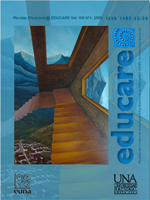Un estudio de caso de la estrategia administrativa basada en comités
DOI:
https://doi.org/10.15359/ree.13-1.8Keywords:
administration, education, strategy, committees, institutionsAbstract
The theory of curricular administration is applied in order to explain the use of the strategy of management committees in institutions of elementary and high school education. A case study is carried out in an educational institution of the metropolitan area; an institution known for organizational features that are common in a national reality that affects the malpractice of this strategy. It is established within the case study, some of causes of its abuse in the particular context of the educational institution “Unidad Pedagógica José Rafael Araya Rojas” located in the “Tibás, La Florida” community and in the light of these results, some recommendations are suggested in order to improve the use of the administrative strategy based on committees.
References
Alba, A. (1994). Currículum: crisis, mito y perspectivas. México: Universidad Nacional
Autónoma.
Aguerrondo, I. (1996). La Escuela como una organización inteligente. Buenos Aires, Argentina:
Troquel.
Arias, R. (1994). Desafíos de la planificación educativa. Costa Rica: División de Planeamiento y
Desarrollo Educativo. San José, Costa Rica: Servicio de documentación del departamento de
planes y programas del MEP.
Bolaños, G. & Molina, Z. (1995). Introducción al currículum. San José, Costa Rica: EUNED.
Costa Rica. Ministerio de Educación Pública (MEP) Consejo Superior de Educación. (1994).
Política educativa hacia el siglo XXI. San José, costa Rica: Autor.
Doryan, E. (1995). Una propuesta de un proyecto educativo nacional hacia el año 2005. San José,
Costa Rica: Departamento de publicaciones del Ministerio de Educación Pública.
Gurriarán, J. (1994). La planificación educativa en el futuro. Costa Rica: División de Planeamiento
y Desarrollo Educativo. San José, Costa Rica: Servicio de documentación del departamento
de planes y programas del MEP.
Mayer, F. (1967). Historia del pensamiento pedagógico. Buenos Aires, Argentina: Kapelusz.
Meza, I. & Pascual, E. Curriculandia. (2004). Material de apoyo curso Diseño Del Currículo. Costa
Rica: Maestría en Tecnología e Informática Educativa.
Richard, D. (2000). Teoría y diseño organizacional. México: International Thomson Editores.
Sarramona, J. (1994). Fundamentos de educación. Barcelona, España: CEAC.
Sarramona, J., Fernández, A. y Tarín, L. (1995). Tecnología didáctica. Barcelona, España: CEAC.
Soto, J. & Bernardini, A. (1998). La educación actual y sus fuentes filosóficas. (5ª Reimpres. de la
ª ed.). San José, Costa Rica: EUNED.
Downloads
Published
How to Cite
Issue
Section
License
1. In case the submitted paper is accepted for publication, the author(s) FREELY, COSTLESS, EXCLUSIVELY AND FOR AN INDEFINITE TERM transfer copyrights and patrimonial rights to Universidad Nacional (UNA, Costa Rica). For more details check the Originality Statement and Copyright Transfer Agreement
2. REUTILIZATION RIGHTS: UNA authorizes authors to use, for any purpose (among them selfarchiving or autoarchiving) and to publish in the Internet in any electronic site, the paper´'s final version, both approved and published (post print), as long as it is done with a non commercial purpose, does not generate derivates without previous consentment and recognizes both publisher's name and authorship.
3. The submission and possible publication of the paper in the Educare Electronic Journal is ruled by the Journal’s editorial policies, the institutional rules of Universidad Nacional and the laws of the Republic of Costa Rica. Additionally, any possible difference of opinion or future dispute shall be settled in accordance with the mechanisms of Alternative Dispute Resolution and the Costa Rican Jurisdiction.
4. In all cases, it is understood that the opinions issued are those of the authors and do not necessarily reflect the position and opinion of Educare, CIDE or Universidad Nacional, Costa Rica. It is also understood that, in the exercise of academic freedom, the authors have carried out a rogorous scientific-academic process of research, reflection and argumentation thar lays within the thematic scope of interest of the Journal.
5. The papers published by Educare Electronic Journal use a Creative Commons License:















 The articles published by Educare Electronic Journal can be shared with a Creative Commons License:
The articles published by Educare Electronic Journal can be shared with a Creative Commons License: 



